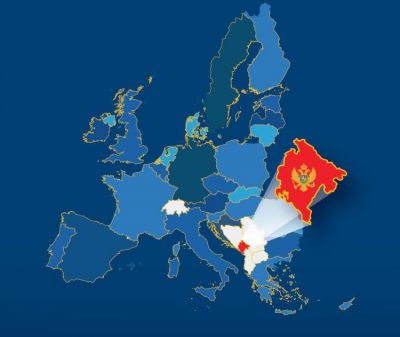Montenegro Being Accelerated to the European Union in a Face-saving Regime

Italians furious at the lack of help and solidarity from the European Union began removing flags of the Union throughout the country and replaced them with Chinese and Russian ones. As this is happening in a long-time member of the European Union, the small Balkan country Montenegro went in the opposite direction and began praising the bloc. Refusing to assist Italy, the credibility of the European Union was dealt a huge blow, and Brussels decided to set aside a significant amount of assistance for Montenegro to mitigate the effects of the spread of coronaviruses. There is no doubt that the promised European Union assistance for Montenegro is certainly welcomed and valuable in the aftermath of delaying all assistance to the European Union’s worst hit countries, Italy and Spain. But this is merely a reaction to the increased popularity of China and Russia in these countries who have all provided assistance in a timely and unbureaucratic manner.
As part of a face saving exercise when many European Union members are questioning the necessity of such a bloc, Brussels has prioritized Western Balkan countries to legitimize itself again by fast tracking the memberships of not only Albania and North Macedonia, but also Montenegro. The European Union Ambassador to Montenegro, Aivo Orav, announced on Twitter that Brussels is allocating €3 million in emergency assistance to the Montenegrin health sector and €50 million for the health sector, the economy and business. This assistance to Montenegro, an aspiring European Union member, is an attempt to salvage the shaky reputation of the European Union. Attempting to regain credibility is understandable, but the big question is to what extent this move by the European Union can change the overall impression that the current crisis has shown a complete collapse of European solidarity.
EU solidarity with 🇲🇪 against #COVID19: we are providing €3million for immediate help to the health sector+designing a €50million long-term response together with @VladaCG to support mostly the health sector, the economy and businesses #CoronaInfoCG #EUzaCG pic.twitter.com/f2y8kXPnxQ
— Aivo Orav 🇪🇺 (@EUAmbME) March 25, 2020
Montenegrin Prime Minister Duško Marković described the European Union assistance to Montenegro as “European values and solidarity in action.” Montenegro will continue to work diligently with the European Commission and the delegation to jointly address the effects of the crisis, Marković said.
Montenegrin President Milo Đukanović then said on Twitter:
“A great decision for our neighbours North Macedonia and Albania. Today – support to Montenegro in fighting COVID-19! EU keeps standing with Western Balkans in the hard times!”
Yesterday – a great decision for our neighbours #NorthMacedonia🇲🇰 and #Albania🇦🇱
Today – support to #Montenegro🇲🇪 in fighting #COVIDー19!#EU🇪🇺 keeps standing with #WesternBalkans in the hard times!— Milo Đukanović (@predsjednik_cg) March 25, 2020
The official Twitter account of the Montenegrin Government went to Twitter to say:
“The EU, in the difficult moments of fighting against coronavirus, stands by Montenegro and provides urgent help for procurement of equipment and protective supplies worth €3 mil through the UN system while working on defining the model for an additional €50 million to help overcome the socio-economic effects of the crisis. We have also agreed to accelerate a € 18million collaborative programme to help small businesses, the most vulnerable categories of society and the unemployed.”
The #EU, in the difficult moments of fighting against coronavirus, stands by #Montenegro and provides urgent help for procurement of equipment and protective supplies worth €3 mil through the UN system… (1/2) #CoronaInfoCG https://t.co/fpczy5n062
— Govt. of Montenegro (@MeGovernment) March 25, 2020
The pro-Western Đukanović helped steer Montenegro into full NATO membership in 2017 and is on track to make his country soon join the European Union. The European Union gives the illusion that it is an alliance of liberal democracy, efficient and free of corruption. However Đukanović is alleged to have strong links to the mafia, as well as involved in smuggling, organized crime and unnecessary privatizations like the Prva Banka, which went to his family.
It is precisely the Western liberal aspect of European Union membership which supposedly united Europe that has been cited as crucial in media close to Montenegrin authorities. Today however, we see that there is nothing of such in the European Union as it quickly turned realist with the coronavirus pandemic. The member states of this organization have been left to fend for themselves in the most difficult and critical situations. From these different treatments of allies, by the EU and NATO on the one hand, and China and Russia on the other, a different composition of the global order will emerge at the end of the coronavirus pandemic.
Although Serbia has blasted so-called European Union solidarity, it remains a lonely voice of the non-member countries of the Balkans. North Macedonia, Albania and Montenegro on Serbia’s southern flank are serving the Western agenda and acting as willing agents to inhibit Russian influence in a region that is overwhelmingly Slavic and Christian Orthodox. Despite the clear corruption of Đukanović, who should be the antipathy of so-called European values, Montenegro was not only fast-tracked into NATO, but is now being accelerated to the European Union in a face-saving regime. It is therefore unsurprising that anti-Serbian sentiment is being pushed by the ruling class in Podgorica to demonstrate to the West that Montenegro will be a partner to pressurize Serbia. Therefore, the accession of Montenegro, Albania and North Macedonia to the European Union and NATO is being used by the West as a mechanism to contain Serbia and halt Russian influence into the Balkans, and also to save their own legitimacy.
*
Note to readers: please click the share buttons above or below. Forward this article to your email lists. Crosspost on your blog site, internet forums. etc.
This article was originally published on InfoBrics.
Paul Antonopoulos is a Research Fellow at the Center for Syncretic Studies.
Featured image is from InfoBrics

